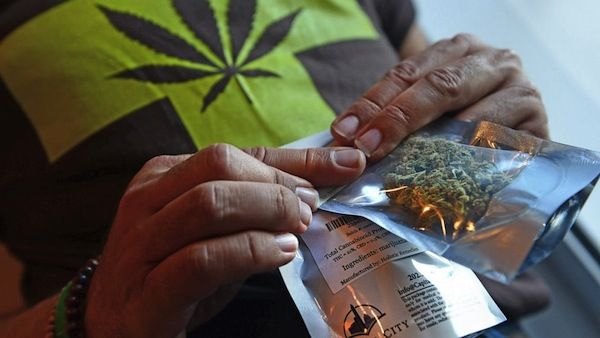- Imagine that one day you decide to set up a business and that the laws of your state, of your country, don't allow you to promote it on the radio, television or the Internet, unless most of these media feature audiences exceeding a certain age. What would you do? This is the question Colorado companies distributing cannabis for recreational use are asking. Now what?

Once again the good intentions of those seeking to put aside old prohibitionist policies have clashed with other laws that have not been updated to reflect the century in which we live. The rapid advance of the cannabis industry has revealed the many loose ends left by politicians, who did not realize that once medicinal and recreational use was permitted the rules of the game would have to change. Because this is not only about stores being able to sell cannabis in a completely legal way, but about them being able to do so under the same conditions as, for example, a neighbourhood delicatessen.
In light of this alleged equality between shops selling meat, fish, or even alcohol in the States of Colorado and Washington, it is bizarre that those who have a cannabis business cannot advertise in the most common places. Two U.S. publications cantering on the world of marijuana have protested this fact: the magazine High Times and Westword, an alternative publication, filed a complaint before a Denver district court judge alleging that rules represent an “unjustifiable burden” and violate the rights to freedom of expression enshrined in and guaranteed by the U.S. Constitution.

Advertising appearing in Westword
The complaint filed by both publications, which includes as defendants Governor John Hickenlooper and the head of the state agency responsible for supervising the marijuana industry, asserts that the prohibition violates the First Amendment to the American Constitution, which upholds freedom of expression. In addition, it reminds the judicial authorities that it was the people of Colorado who voted to decriminalize recreational marijuana use, endorsing its regulation under the same rules as the alcohol industry, which is not subject to this type of impediments.
However, the regulation established by the authorities in the State of Colorado already featured a point dedicated solely and exclusively to advertising. In addition to the fees to be paid by those wishing to open a store, and the way in which the product is to be distributed, the legislators also dictated that establishments dedicated to the sale of cannabis for recreational use could not place advertising on television, radio, the Internet or in print publications unless they could attest that their under-21 audiences did not exceed 30% of the total.
This prohibition also extends to any advertising on billboards or in any other format located outdoors. Similarly, no campaign that seeks to promote a cannabis shop may target consumers who do not live in the State of Colorado. These are very severe restrictions that, in contrast, are not applied to those who sell marijuana for medicinal use.

For now, who is right?
Marcia Krieger, the judge who originally heard the case, dismissed the complaint, arguing that both the High Times magazine and the publication Westword had to present evidence that these advertising restrictions had affected them in one way or another. In response, the magazine's attorney David Lane seems to be working to do just that.
Meanwhile, we already know the opinion of some experts in the field who believe that, in this case,the First Amendment does not cover this type of advertising. In a new collision involving the laws of the State of Colorado and American legislation, two previous verdicts issued by the Supreme Court of the United States maintained that the First Amendment to the U.S. Constitution did not protect "commercial arguments related to illegal activity."
Professor Eugene Volokh of the University of California, an expert on this matter, has stated that in this case "the restriction on commercial speech is imposed by the State." This situation could call into question a declaration by the United States Department of Justice which, in October of 2013, stated that it would not interfere with the legalization of marijuana in Colorado and Washington, provided that strict rules were established to keep cannabis out of the reach of children, criminal gangs, and the neighbouring states. With regards to advertising, these conditions have not been violated.
These ads did not exceed the limits either
Taking advantage of the loopholes that for some time now have appeared in the U.S.'s fragmented legal provisions, there are already companies involved in the cannabis market willing to advertise on television. Such is the case of MarijuanaDoctors.com, a company acting as an intermediary between those seeking marijuana for medicinal use and doctors with the authority to write prescriptions.
This television ad will begin airing soonon channels like Fox, CNN, ESPN and others in New Jersey, Chicago and Massachusetts. As incredible as it may seem, this advertising will reach mass audiences almost two decades after the State of California was the first to take the step of legalizing the medical use of cannabis. In a comic tone, a sushi dealer acts as if he were trying to sell illegal goods to a customer. In the end, the company MarijuanaDoctors.com asks viewers a question with a clear message: "Would you buy your sushi from this guy? Then why would you buy his marijuana?"
Despite the stringent legal limits, this is not the first advertising campaign related to the marijuana industry. In 2012, during the campaign for decriminalization in Colorado, activists with the Marijuana Policy Project managed to get this ad on the Ellen DeGeneres Show.
This same group also managed for major channels, including CNN and MSNBC, to air another ad during the Democratic National Convention, calling for the legalization of marijuana.
Despite all this, there are numerous barriers which daring cannabis entrepreneurs still encounter when they seek to promote their products on the quintessential mass media instrument. Jason Draizin, CEO of MarijuanaDoctors.com, pointed out that the road has not been easy: "Over the last decade we've been rejected by countless TV channels." Their efforts, however, may mark a turning point.
------------------
With information from The Huffington Post, Time, Forbes and The Denver Post.
------------------
Please remember that during the summer months (July and August) we have a promotion campaign going on at Dinafem website which will increase your body temperature. Besides the usual promotion of 1 free seed for every 30 euros of purchase, during these summer months, you can also benefit from the following advantages:




Comments from our readers
There are no comments yet. Would you like to be the first?
Leave a comment!Did you like this post?
Your opinion about our seeds is very important to us and can help other users a lot (your email address won't be made public).